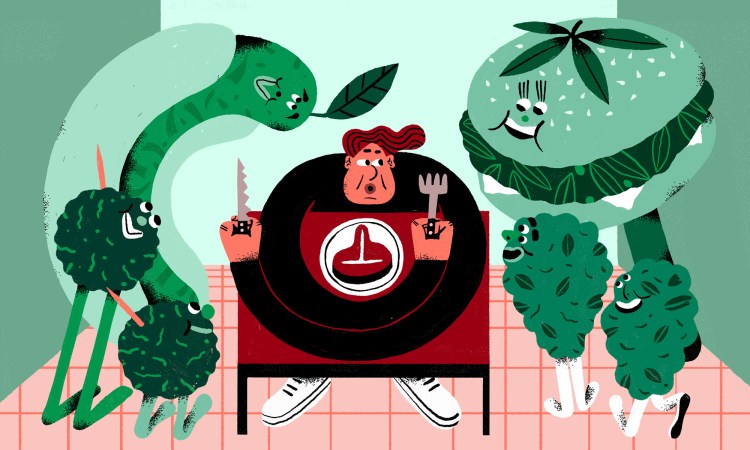
If we want the people in our lives to put down their steak knives and seriously consider changing their diets, we need to change the conversations we’re having with them, says food innovator Bruce Friedrich. Here’s what to say — and what not to say.
We can’t stop eating meat. Global consumption averages 94.8 pounds per person a year, and it’s expected to increase as much as 76 percent by 2050. In steak- and burger-loving countries such as Australia and the US, the average person eats between 220 and 240 pounds of meat and poultry a year.
Yet at the same time, researchers are increasingly aware of the serious consequences of our carnivorous diets. “In 2019 … 30 of the world’s leading scientists released the results of a massive three-year study into global agriculture and declared that meat production is destroying our planet and jeopardizing global health,” said Bruce Friedrich, cofounder and executive director of the Good Food Institute, an organization that supports the creation of plant-based and cell-based meat, in a TED Talk.
What’s more, eating meat has been shown to have a negative impact on personal health. A large-scale analysis found that a long-term diet of high amounts of red meat, particularly processed meat, is associated with an increased risk of mortality, cardiovascular disease, colorectal cancer, and type 2 diabetes. In fact, the World Health Organization’s International Agency for Research on Cancer (IARC) has classified processed meat as a human carcinogen due to its association with colorectal cancer, and WHO has classified red meat as “probably” carcinogenic because of its links to colorectal cancer.
Despite all the evidence, people aren’t putting down their double cheeseburgers, something that Friedrich, a TED Fellow, knows all too well. “Lots of people oppose the harms of industrial animal agriculture, but when they sit down to eat, they put their ethics to the side and they eat what is delicious and orderable,” he says.
So if we want people’s habits to change, then perhaps we need to change the conversations that we’re having with our families and friends about meat. “For 50 years, environmentalists, global health experts and animal activists have been begging the public to eat less meat,” said Friedrich in his TED Talk. “And yet, per capita meat consumption is as high as it’s been in recorded history.” That means it’s time to stop pleading (“If you really loved me or the planet, you’d go vegan”), demanding (“If you want to eat meat, you’re cooking every meal for yourself from now on!”), bribing (“I’ll let you listen to Ed Sheeran in the car if you do this”), or cornering them (“Surprise! Instead of steak Sundays, I decided we’re doing tofu stir-fry Sundays!”).
Whether it’s your steak-loving partner or parent or your tween cousin who lives on chicken nuggets, here are 7 steps to take to persuade them to cut down on eating meat.
1. First things first: Have the conversation separate from the dinner table.
Let’s call the meat eater in your life “M.” The absolute worst time to engage M in a discussion like this is when they’ve got a forkful of roast beef or roast chicken en route to their mouths. Should you persist, your words will do nothing to kill their enthusiasm for meat — just you.
2. Avoid saying anything that might sound like you’re judging them.
M is no fool. They know it’s not good to eat too much meat, particularly red meat — and they should be eating more fruits and veggies, too. So when you broach this topic, they’ll immediately be on the defensive.
Often, meat eaters might feel like their whole life is being questioned when vegetarians and vegans speak to them about their habits. As vegan advocate Tobias Leenaert puts it in his blog The Vegan Strategist, “People will often feel that your behavior (i.e., your eating or being vegan) is an implicit condemnation of theirs (their eating meat).”
3. Instead of saying, “You should eat less meat” or “You need to stop eating meat,” focus on why you eat the way you do.
Start sentences with “I” statements to show you’re talking about your own decisions and the thinking behind them; you’re not criticizing them. Since you’re trying to have a conversation with them, pause and leave space for them to take in what you said, ask questions and make comments. Nobody, no matter what they eat, likes to be lectured.
You could say something like, “After I read about the connection between animal farming and climate change, I’ve started doing Meatless Mondays. It hasn’t been too hard, and I made the most delicious farro salad last week. I’ll make extra next time so you can try it too.”
4. Appeal to the values that drive them — not you.
In his research, Stanford University social psychologist Robb Willer has found it’s much more than political beliefs that are dividing liberals and conservatives — underneath their differences is a fundamental split in moral values. “Liberals tend to endorse values like equality, fairness and care and protection more than conservatives do,” he explained in a TED Talk. “And conservatives tend to endorse values like loyalty, patriotism, respect for authority, and purity more than liberals do.”
If M is conservative, you might touch upon values like purity and patriotism when you’re talking about a low- or no-meat diet. The animals raised on factory farms are a far and freakish cry from what people ate 20 or 50 years ago; they’ve been specially engineered to yield the maximum amount of meat. Friedrich says, “If you asked your average consumer, ‘Would you want to eat a chicken who grew six times as quickly as chickens would naturally grow, due to genetic manipulation?’ I would guess that just about everybody would say no.”
There’s another important way in which mass agriculture has resulted in unnatural animals: widespread antibiotic use. “Most of the antibiotics produced globally are fed to farm animals — not because they’re sick but because feeding them antibiotics makes them grow more quickly,” says Friedrich. “And because feeding them antibiotics will allow them to live through conditions which would otherwise cause massive numbers of them to die.”
And if M is a liberal, you can speak about the environmental toll of large-scale farms – deforestation, air and water pollution, a warmer planet – and how many of these impacts are felt most by people who are already financially and physically vulnerable.
5. Position meatless food products as an addition or alternative to what they’re eating, not a replacement.
Unless they’re primed for change, a confirmed carnivore like M won’t embrace a vegan lifestyle after a single conversation — or many conversations. That’s completely OK, and make sure they know you don’t expect them to. But they could begin adding, say, quinoa burgers with avocado tzatziki to their regular meal rotation and see if they like it.
6. Tell them that a shift away from meat is a change that is here to stay — all the big meat companies are on board.
The meat industry is rapidly changing, and plant-based meat — such as the Impossible Burger and Beyond Meat — is gaining popularity. Showing this is not a fleeting trend but a major shift, the world’s three biggest meat producers — JBS, Tyson, and Cargill — are rebranding as “protein” companies rather than “meat” companies. Both JBS and Tyson manufacture plant-based alternatives, and Tyson and Cargill are investing in cell-based meat (i.e., meat that’s cultured in a lab rather than raised on a farm) as well.
Many fast-food outlets provide meat-free alternatives, too. Burger King and White Castle have begun selling some form of the Impossible Burger; outlets of A&W, Carl’s, Tim Horton and Dunkin Donuts offer Beyond Meat products.
Although plant-based meat is currently pricier than conventional meat, the cost is expected to go down as demand and competition rise. Soon, according to Friedrich, plant-based meat will be cheaper than traditional meat.
7. On the horizon: Cell-based meat that’s just like the real thing.
And if M remains unconvinced, tell them that cell-based meat is coming soon. It’s made from actual meat cells, so it will look and taste just like the meat they currently eat. However, it will be produced in facilities in ways that avoid many of the problems associated with traditional meat farming and processing.
Friedrich predicts that cell-based meat should be available to consumers in limited quantities in two to three years. Its existence could be the game-changer that ends the need for any such conversations with M, once and for all. “We will produce products that people want to buy, and we will make it the default choice, a choice that is better for health, the environment and animals,” Friedrich says.
Watch Bruce Friedrich’s TED Talk now:

















